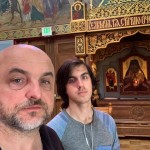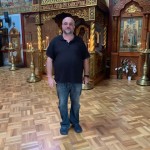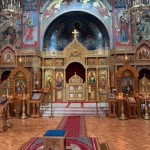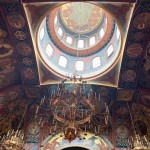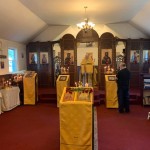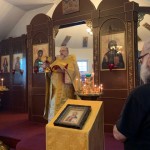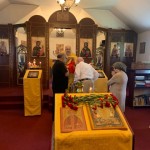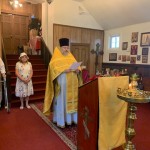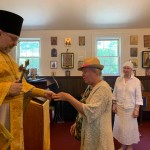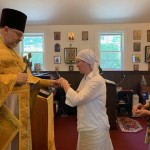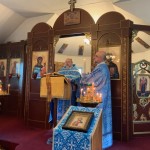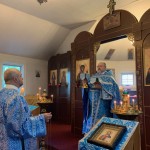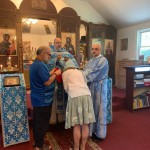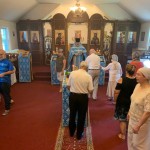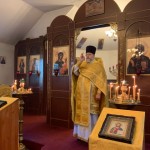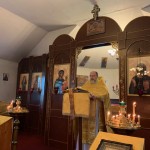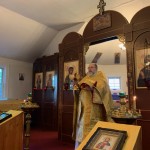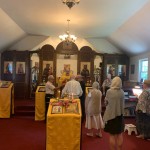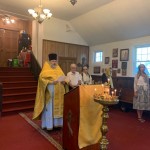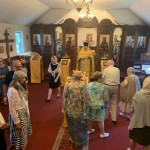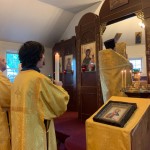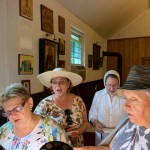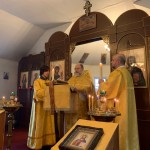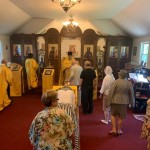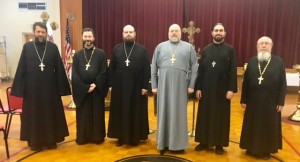On July 14, on the 4th Sunday after Pentecost, the Rector of St. George Church, Archpriest Igor Tarasov served the Divine Liturgy in our parish temple. On that day we also observed feast of the Holy Major Apostles Peter and Paul which was transferred to Sunday. Service was well-attended. In addition to our parishioners, several Merchant Marine Academy cadets came and prayed at our Liturgy.
After the readings from the Sacred Scripture the Rector preached the following homily I English:
“Dear brothers and sisters in Christ! Today is the 4th Sunday after Pentecost and we also celebrate feast of the Holy Major Apostles Peter and Paul.”
“Our Sunday Gospel lesson is telling us about a healing of the servant of the Roman centurion performed by our Lord Jesus Christ from the distance. The centurion was a Roman officer under whose command there were one hundred soldiers. It is interesting that today we have representatives of the military present at our church. We welcome them and we are glad that they came on this Sunday when we read the Gospel about a military man, a centurion. He approached the Lord and beseeched Him to cure his servant who was lying at home dreadfully tormented. Jesus agreed to come and to heal him. But the centurion was a Gentile, a pagan, so he considered himself unworthy for Christ to enter into his home. Thus he said to Jesus, “Lord, I am not worthy that You should come under my roof. But only speak a word, and my servant will be healed” (Mt. 8, 8). These words impressed Jesus and He said that He found no such faith in Israel. The Lord also prophesied that other nations, the Gentiles will come to God and will take the seats along with Jewish Patriarchs of old while many present Jews will be cast out (Mt. 8, 10-12).”
“Dear brothers and sisters! The centurion from today’s Gospel is a great example of firm faith and trust in the power of the Lord. It is also an example of humility, a humble attitude of being unworthy before God. All these beautiful virtues can be found in the Holy Major Apostles Peter and Paul whom we honor today.”
“Our second Gospel lesson today tells us how Holy Apostle Peter expressed his very firm faith in the Lord Jesus calling Him “the Christ, the Son of the Living God” (Mt. 16, 16). Jesus was also impressed by that faith and called Peter the Rock on which He will build His Church (Mt. 16, 17-18). But Peter had also a trust and a humble attitude. He trusted heavenly revelation and humbly accepted what heavenly Teacher instilled in his heart, and when he was asked, he professed that truth. Every learning begins with humility and trust in the teacher. Same with the knowledge of spiritual and divine matters. His humility, his trust made Simon Peter “the Rock” on whom the Lord desired to build His Holy Church.”
“Holy Apostle Paul, at first, was not one of the Disciples of Christ. He was an enemy of Christ, a persecutor of Christians. But the Lord appeared to him in a shining light and revealed that He is Christ whom he is persecuting. And Paul humbly followed where Christ was leading him. He also had humility and trust that the One who appeared to him is the Lord and God. And Paul persevered in many labors, sufferings, sorrows and perils. In today’s Epistle lesson we heard how he himself testifies that he suffered more than all other Apostles (2 Cor. 11, 23-32). But Paul did not praise himself for that. On the contrary, he preferred to boast in the things which concern his infirmity. And willing to tell about the revelation he received, he says that it is not profitable for him to boast. But he speaks about himself in the third person: “I know a man in Christ… such a one was caught up to the third heaven… he was caught up into Paradise and heard inexpressible words, which it is not lawful for a man to utter” (2 Cor. 12, 2-3). St. Paul had such a revelation, he was caught to heaven, but he does not want to boast, to exult himself.”
“Dear brothers and sisters! The power and holiness of the Holy Apostles Peter and Paul is in such humility. They humbly follow their Teacher and they do not praise themselves for being close to Him. They teach nothing from themselves but only what Christ entrusted them to teach. Holy Apostle Peter even asked to be crucified upside down because he felt to be unworthy to be crucified like Christ. Holy Apostle Paul also repented all his life for being a persecutor of Christ. In his Epistle he called himself a “one born out of due time”, “the least of the Apostles, not worthy to be called an Apostle” (1 Cor. 15, 8-9). He wrote that all his success and miracles he witnessed and made were due to the grace of God, not to his own merits.”
“And because of their faith, trust and humility, Holy Major Apostles Peter and Paul are the teachers of the universe, our guides to Christ and to His heavenly Kingdom. We know that usually good students become later good teachers. And good students are those who believe and trust their teacher and humbly receive the knowledge offered to them. Let us remember that the gates of hell won’t prevail not only against the Holy Church built on the rock of true faith of the Apostles, but those terrifying gates will not prevail against us if we will be in the Church, and if we will have faith, trust and humility of the Holy Apostles. Let us then follow Christ with a firm faith, trust and humility as the Holy Apostles Peter and Paul did!”
The choir nicely performed hymns in honor of St. Peter and Paul during preparation for Holy Communion.
Following the dismissal of the Liturgy the Rector performed the rite of glorification in the middle of the temple singing the troparion, kontakion and magnification of the Holy Major Apostles. He also preached a short sermon in Russian stressing the main ideas of his English homily.
Our celebration continued after the service at the trapeza table where the Rector and parishioners enjoyed delicious and abundant meals and a nice company.

